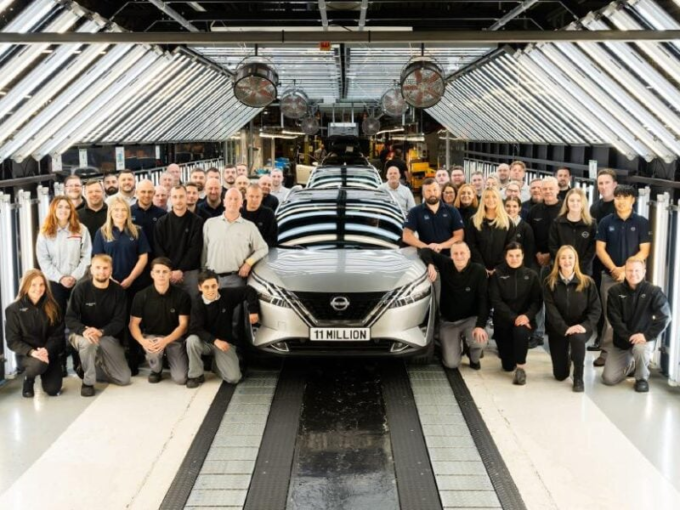Troubled Japanese car maker Nissan is to cut 20,000 jobs and reduce its global capacity by almost half to stem dramatic losses.
The company lost over $4.5bn last year, with partner Renault taking a €2.2bn hit in its first quarter accounts as a result. This was down from a profit of $426.6bn the previous year.
The Re:Nissan plan aims for cost savings of Y500bn ($5bn) this year by cutting costs, pausing development projects and closing 7 of its 17 plants in the face of the automotive downturn and US tariffs. Whether this includes the plant at Sunderland in the UK (above) and the associated £1bn battery gigafactory being built by Envision AESC is as yet undecided.
The company is moving 3000 staff from development projects to work on cost reductions. This was made possible through the recent implementation of a shortened development process that reduces lead time and ensures no delays in product launches, says the company. This will cut the development lead time of the first vehicle to 37 months and subsequent family vehicles to 30 months.
At the same time it is reducing engineering costs, complexity, and improving development speed. This will include combining global R&D facilities and allocating work to competitive locations to reduce the average cost per hour by 20%.
Nissan will also restructure its supplier panel to secure more volume for fewer suppliers and to reduce parts complexity by 70%, which will include moving from legacy standards. The integration and optimization of platforms will decrease the number of platforms from 13 to 7 by 2035, starting with an all-new Nissan Skyline, C-class SUV and Infiniti compact SUV.
“In the face of challenging FY24 performance and rising variable costs, compounded by an uncertain environment, we must prioritize self-improvement with greater urgency and speed, aiming for profitability that relies less on volume. As new management, we are taking a prudent approach to reassess our targets and actively seek every possible opportunity to implement and ensure a robust recovery,” said Ivan Espinosa, CEO of Nissan who took over after a failed merger with Honda.
“Re:Nissan is an action-based recovery plan clearly outlines what we need to do now. All employees are committed to working together as a team to implement this plan, with the goal of returning to profitability by fiscal year 2026.”
Half the saving will come from engineering and cost efficiencies while implementing a rigorous governance model. A dedicated cross-functional transformation office under Chief TdC* Officer staffed by around 300 experts, has been established and is empowered to make cost decisions.
The other half will come from the consolidation of vehicle production plants from 17 to 10 by fiscal year 2027. The company will also streamline its powertrain plants and accelerate its capital expenditure reductions, including the cancellation of the planned Lithium Iron Phosphate battery plant in Kyushu.
On top of the 9,000 job cuts previously announced, 11,000 more roles will go globally across covers direct/ indirect roles and contractual roles in manufacturing, sales and R&D.
Several projects with its alliance partners, Renault and Mitsubishi Motors (MMC) are underway, including the recently announced initiative for an all-new battery electric vehicle (BEV) based on the next-generation LEAF for MMC’s North American market. Nissan and Honda will continue the collaboration on vehicle intelligence and electrification.



Leave a comment